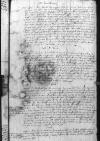Das du deins bawens fleissig bist, / ist uns nicht widrig. / Du magst mit gutter musse, / wan es dir bekuemet, / wider zu uns gedenck(en). / Unser ⌊Papuske⌋ ist gestern(n) von ko(nigliche)mm written over n(n)⌈n(n)m(m)mm written over n(n)⌉ hove wider komen(n). / Uns wirt geschrib(en), das ⌊ko(niglich)e m(ajeste)t⌋ in irer gewonlicher krancheit des alters fast swach ist / und derhalb(en) bey hove wenig ausgericht werde etc. Das erczbischoffsampt sol dem(m) ⌊von(n) der Koye⌋ geb(e)n werd(en), / wirt gleich vorsogt sein wie zuvor. / Der ⌊vorstorbne erczbischoff⌋ ist uber die fumffczig tausent guld(en) schuldig blib(e)n. / Bey / den er solche schult gemacht hoth, / thun in bewhenen(n), / und sonst hort man nyma(n)t(e)n klag(en) etc. Dem ⌊h(e)rn von ⌊Ploczko⌋⌋ / sol das krakowssche bisthum geb(e)n werd(en) etc. Sonst ist uns von zceitung(en) nichts geword(en). / Die magstu ⌊A⌋ anzceigen(n) und von im, / was sich begeben(n) wirt, / dich erkundig(en) / und in gesuntheit mitbreng(en). / Gotlich(e)n gnad(en) befholen(n).
 AAWO, AB, D. 7, f. 53r (c.p.1)
AAWO, AB, D. 7, f. 53r (c.p.1) 